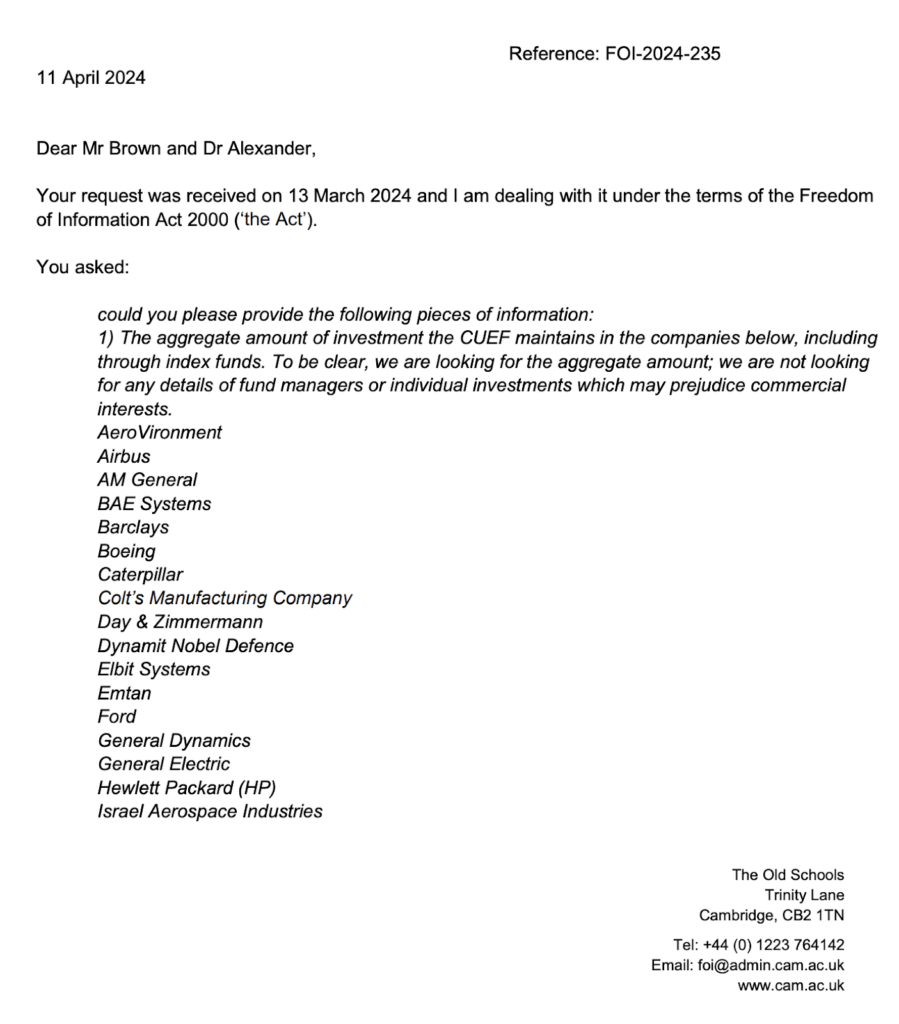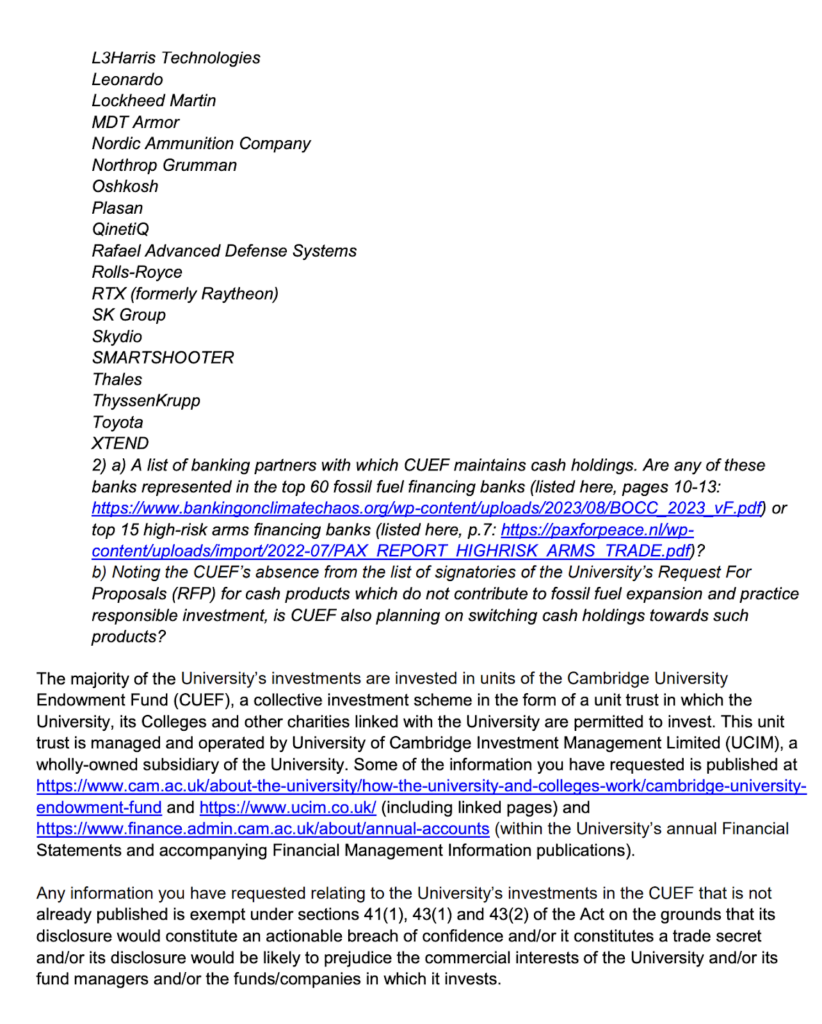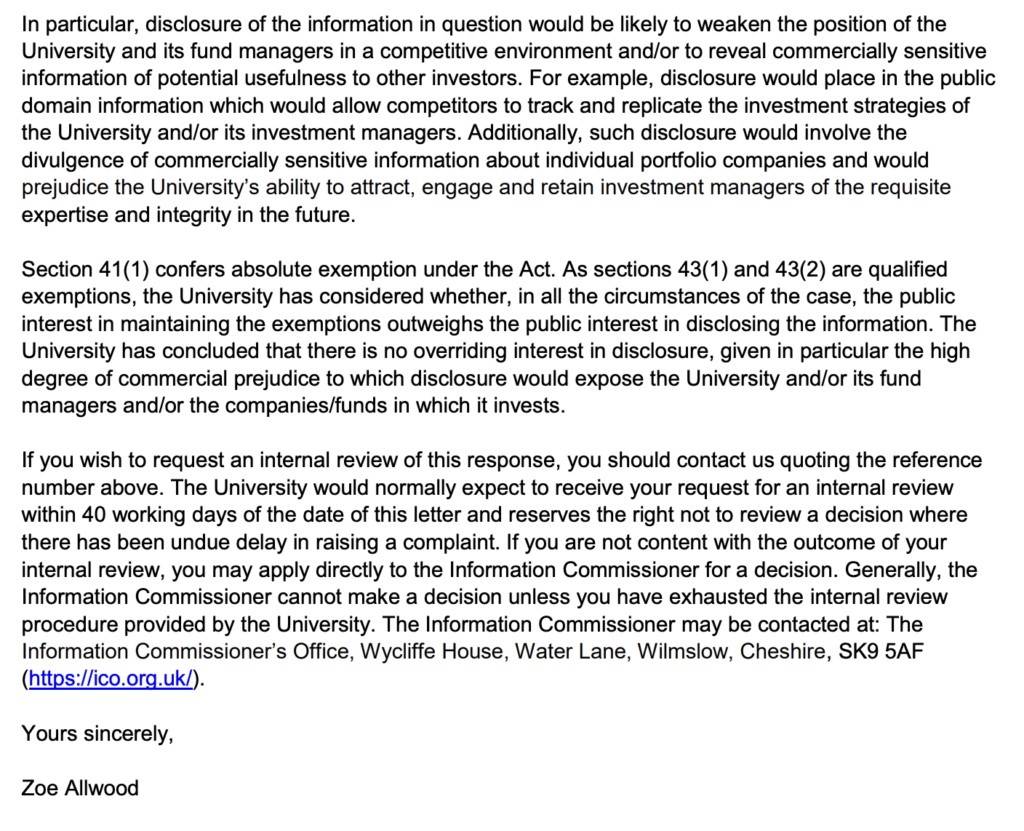Cambridge University Endowment Fund (CUEF)
The CUEF is an investment fund. The Fund is managed by University of Cambridge Investment Management Limited (“UCIM”), wholly owned by Cambridge University. According to the 2024 report, “Investors in the Fund include Cambridge University, 16 Colleges and five associated Trusts. Over the last 10 years, the Fund has distributed nearly £1.2 billion to these investors.”
Divested?
No.
FOI Request
Refused.
Our source is an email from a representative of the CUEF in reference to a freedom of information request. The response reads as follows:
Dear Mr Brown and Dr Alexander,
Your request was received on 13 March 2024 and I am dealing with it under the terms of the Freedom of Information Act 2000 (‘the Act’). You asked:
Could you please provide the following pieces of information:
- The aggregate amount of investment the CUEF maintains in the companies below, including through index funds. To be clear, we are looking for the aggregate amount; we are not looking for any details of fund managers or individual investments which may prejudice commercial interests.
- AeroVironment;
- Airbus;
- AM General;
- BAE Systems;
- Barclays;
- Boeing;
- Caterpillar;
- Clot’s Manufacturing Company;
- Day & Zimmerman;
- Dynamic Nobel Defence;
- Elbit Systems;
- Emtan;
- Ford;
- General Dynamics;
- General Electric;
- Hewlett Packard (HP);
- Israel Aerospace Industries.
- L3Harris Technologies;
- Leonardo;
- Lockheed Martin;
- MDT Armor;
- Nordic Ammunition Company;
- Northrop Grumman;
- Oshkosh;
- Plasan;
- QinetiQ;
- Rafael Advanced Defence Systems;
- Rolls-Royce;
- RTX (formerly Raytheon);
- SK Group;
- Skidoo;
- SMARTSHOOTER;
- Thales;
- ThyssenKrupp;
- Toyota;
- XTEND.
- A list of banking partners with which CUEF maintains cash holdings. Are any of these representing in the top 60 fossil fuel financing banks (listed here, pages 10-13) or top 15 high-risk arms financing banks (listed here, p. 7)?
- Noting the CUEF’s absence from the list of signatories of the University’s Request For Proposals (RFP) for cash products which do not contribute to fossil fuel expansion and practice responsible investment, is CUEF also planning on switching cash holdings towards such products?
The majority of the University’s investments are invested in units of the Cambridge University Endowment Fund (CUEF), a collective investment scheme in the form of a unit trust in which the University, its Colleges and other charities linked with the University are permitted to invest. This unit trust is managed and operated by University of Cambridge Investment Management Limited (UCIM), a wholly-owned subsidiary of the University. Some of the information you have requested is published at https://www.cam.ac.uk/about-the-university/how-the-university-and-colleges-work/cambridge-university-endowment-fund and https://www.ucim.co.uk/ (including linked pages) and https://www.finance.admin.cam.ac.uk/about/annual-accounts (within the University’s annual Financial Statements and accompanying Financial Management Information publications).
Any information you have requested relating to the University’s investments in the CUEF that is not already published is exempt under sections 41(1), 43(1) and 43(2) of the Act on the grounds that its disclosure would constitute an actionable breach of confidence and/or it constitutes a trade secret and/or its disclosure would be likely to prejudice the commercial interests of the University and/or its fund managers and/or the funds/companies in which it invests.
In particular, disclosure of the information in question would be likely to weaken the position of the University and its fund managers in a competitive environment and/or to reveal commercially sensitive information of potential usefulness to other investors. For example, disclosure would place in the public domain information which would allow competitors to track and replicate the investment strategies of the University and/or its investment managers. Additionally, such disclosure would involve the divulgence of commercially sensitive information about individual portfolio companies and would prejudice the University’s ability to attract, engage and retain investment managers of the requisite expertise and integrity in the future.
Section 41(1) confers absolute exemption under the Act. As sections 43(1) and 43(2) are qualifies exemptions, the University has considered whether, in all the circumstances of the case, the public interest in maintaining the exemptions outweighs the public interest in disclosing the information. The University has concluded that there is no overriding interest in disclosure, given in particular the high degree of commercial prejudice to which disclosure would expose the University and/or its fund managers and/or the companies/funds in which it invests.
If you wish to request an internal review of this response, you should contact us quoting the reference number above. The University would normally expect to receive your request for an internal review within 40 working days of the date of this letter and reserves the right not to review a decision where there has been an undue delay in raising a complaint. If you are not content with the outcome of your internal review, you may apply directly to the Information Commissioner for a decision. Generally, the Information Commissioner cannot make a decision unless you have exhausted the internal review procedure provided by the University. The Information Commissioner may be contacted at: The Information Commissioner’s Office, Wycliffe House, Water Lane, Wilmslow, Chesire, SK9 5AF (https://ico.org.uk/).
Yours sincerely,
Zoe Allwood
Show screenshot



Investment Principles
Cambridge University Endowment Fund Annual Report (2024) mentions environmental and net zero targets but is silent on the issue of arms investments.
In the University Reporter (13 Aug 2021), page 45:
Statement of Investment Responsibility
6 October 2021
In June 2008, the Council approved a Statement of Investment Responsibility (Reporter, 6158, 2008–09, p. 1002), commended by the Executive Committee (now titled the Committee on Benefactions and External and Legal Affairs) and the Investment Board. The Statement sets out the University’s approach to ethical investment. It has been adopted by Cambridge Investment Management Limited (the regulated entity responsible for managing the University’s Endowment Fund).
The Committee on Benefactions and External and Legal Affairs has a responsibility to review the Statement of Investment Responsibility annually. Following the review in 2020–21, the Council has approved changes to the Statement. This update reflects discussions around climate change, and records the Investment Office’s commitments in response to the publication of the report Divestment: Advantages and Disadvantages for the University of Cambridge (Reporter, 6590, 2020–21, p. 13).
The amendments to the Statement (last revised in 2016; Reporter, 6430, 2015–16, p. 636) revise existing paragraph 10, renumber it as 11 and insert a new paragraph 10, which read as follows:
10. The Investment Office is committed to ensuring that the CUEF is positioned to prosper in a future net-zero economy. The Office will reduce fossil fuel exposure as swiftly as possible, in a manner consistent with the CUEF’s successful investment model. Specifically, by 2030, the Investment Office aims to have no meaningful direct or indirect exposure to fossil fuels in the Fund’s portfolio. The longer-term ambition of the Investment Office is to achieve net‑zero greenhouse gas emissions from CUEF’s investment portfolio by 2038, in line with the University’s programme to reduce its own emissions to net zero.¹
11. The University’s Committee on Benefactions and External and Legal Affairs is responsible for keeping the policy on Investment Responsibility under review. Without prejudice to its power to review the policy at any time in so far as it considers it necessary to do so, the Committee will meet for this purpose with the University’s Chief Investment Officer and Director of Finance at least once a year. The appropriate SU Sabbatical Officer will be invited to attend these meetings. Any matters relating to the application of the policy should be addressed in writing to the Registrary.
¹ See the Council’s statement on the report ‘Divestment: Advantages and Disadvantages for the University of Cambridge’